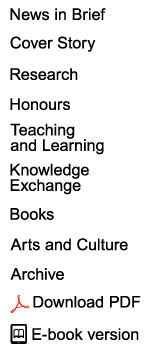LANGUAGE LESSONS
The medium of school instruction impacts not only student learning, but also business, politics and culture. In Hong Kong it is usually framed as a stark choice: learn in Cantonese, or Putonghua, or English. But Professor Angel Lin proposes translanguaging and pluralingualism.
In Hong Kong classrooms, students are expected to use only the language they are instructed in. Increasingly that has meant Putonghua, but there are also English-medium classes that supposedly teach content subjects only in English. To Professor Angel Lin in the Faculty of Education, this single-minded approach is ineffective and potentially harmful.
“If you say ‘no Cantonese’ in a class, the students will slip notes to each other and illegally speak in Cantonese. If you ban anything in a class, they will always resist,” she said.
What’s worst, they can end up disliking subjects that they think represent the language they are struggling with, such as Chinese literature, history and culture.
While pedagogically it is best for students to learn in their most familiar language, Professor Lin does not think Hong Kong should abandon bi- and trilingualism because students gain ‘utility’ from being able to communicate in Putonghua and English. Rather, a change is needed in the notion that languages should be compartmentalised and separated from each other.
Professor Lin has been researching the ‘translanguaging’ approach which recognises that people draw on whatever linguistic resources are available to them for the task at hand.
“People in Hong Kong do this all the time,” she said. Any casual eavesdropping in coffee shops or on trains shows people often mix two or more languages – in theoretical terms they are ‘translanguaging’. While superficially this is similar to code-switching, the latest sociolinguistics theories hold that translanguaging better recognises the dynamic, fluid nature of language.

![]() The more languages we speak and the more open-minded we are about the dynamic, fluid nature of language and culture, then the less likely we will become culturally essentialised.
The more languages we speak and the more open-minded we are about the dynamic, fluid nature of language and culture, then the less likely we will become culturally essentialised. ![]()
Professor Angel Lin
Mixing it up
“Somehow schools are under the pedagogical ideology that languages should be kept apart and that you can develop bilingualism through compartmentalised monolingualisms – that is, one classroom only in English, one only in Putonghua, one only in Cantonese.”
With a translanguaging approach, all three languages would mix in the classroom in a systematic way that is built into the lesson and curriculum planning and the materials used. Professor Lin has been testing this approach in a bilingual school in Thailand that is teaching mathematics with both English and Thai materials (currently she cannot do this in Hong Kong because of the Government’s one-language policy in classrooms).
That study is still underway, but Professor Lin believes the translanguaging approach could help not only student learning, but Hong Kong society.
“It’s linked to the question of identity. The more languages we speak and the more open-minded we are about the dynamic, fluid nature of language and culture, then the less likely we will become culturally essentialised and say ‘I’m Mainland’ or ‘I’m Hong Kong’ or ‘I’m English’. We can be all of these at the same time and not bounded by a single identity. Language can be conducive to breaking binary oppositions and achieving plurilingualism and pluriculturalism.”



